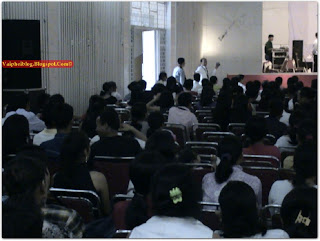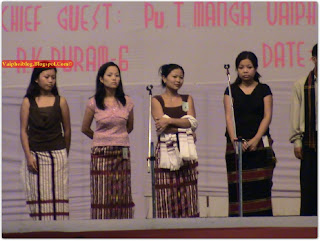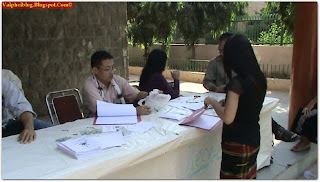Saturday, September 29, 2007
Friday, September 28, 2007
Structural-Administrative Problems Amongst the Tribals in North East India
A Special Case of the Zo (Chin-Kuki-Mizo-Zomi) Family-Nation - Manglal of Lamka
One of the causes of the problem in today’s North East India is the super-imposition of British administrative system amongst the tribals and in the tribal lands.
- some NGOs, journalists and social/society workers in North East India
That was the historical and scientific findings of some of the NGOs, journalists and social thinkers in North East India as they attempt to understand and address the turmoil that North East India is in.
Tribals, particularly the Zo people, already faced enough cultural, economical, political, military, psychological, educational, administrative and administrators invasions into their own heartland. We do not need anymore of any invasion in whatever form, shape or size!
Our tribal administrative systems were almost completely wiped out with the introduction (in fact, imposition; italicized, emphasis throughout) of different modes of administration. With that imposition, so also goes our authority over our own self, people and land – to affair ourselves in accordance with tribal polity and traditional administration.
The Case Against British Government
We know it is not a myth that we governed ourselves and administered our country before the British arrivals. Then they invaded our people and land. We raided their camps to show our opposition and displeasure to this invasion of our independent country. Instead they conducted an ‘expedition’ against the indigenous populace – justifying that we attacked them, while they are the actual ones who attacked us first by committing a historical injustice – entering our land without our administrators’ permission and conducting military, administrative and political business without our authorization. Here it is worthwhile to note that however primitive and remote our tribal polity and administrative system may be at that time – it is still a law and a government – legal and sovereign - in today’s context! However fearful-look and ill equipped our standing army (warriors) may be at that time compared to the British soldiers who were heavily fortified, ours was legal national soldiers, and there’s was illegal intruders. However ignorance and untrained our rulers maybe in the eyes of the imperialism compared to the British trained administrators and political observers, ours was a time tested and experience trained rulers who masters our land and people.
British Imposed Expedition and Administrative System
Sometimes I wonder whether it’s a joke the British India coining the term ‘Lushai-Chin-Kuki Expedition’. One feels like asking them whether they understand English. A kinsman from Aizawl cannot accept the term ‘expedition’ inserted by the British in their military invasion against our people, in our land. He said that in military parlance, expedition is supposedly to be carried out only against the guilty party. But now, here is these white men invading us and our land. And when we opposed them, they carried out an ‘expedition’ against us. In historical, territorial, military, political and administrative justice and fairness, the Zo people are the one who should conduct expedition against the illegal occupational-invaders – the British.
It seems that is not enough, the British super-imposed their way of administration and polity upon our Zo traditional administration, governance and polity. Here lies the genesis of our administrative and political problems. It put our cultural, economical, political and territorial future into the hands of outsiders. The tension begins. The struggle just began.
The Case Against Indian Government
Just after Independence India, instead of working out the welfare of the Zo people in relation to their territory, their land was cut by three international boundaries. Not only that, in India we were absorbed into Greater Assam. And we saw in the subsequent years our land was transferred and divided to states, union territories and districts. We played very little part in it. Pathetic indigenous people, we have no much say in the affairs and destiny of our own land – founded and protected by our great and loving forefathers and foremothers.
And as if that is not enough, administrative system and administrators – one after another – strange and foreign to us were imposed and sent by the Indian government. The imposition is handed down. The tensions heightened. The struggle continues.
The Case Against Manipur Government
Even after Manipur attained statehood, instead of gaining wisdom and having compassion towards the Zo people because of their shared experienced and long-hard struggles, Manipur government bulldozed the Zo interests. Upon the Tuitha river, a dam called ‘Khuga’ Dam was constructed. The name imposed and alien to the indigenous inhabitants. A town called by the indigenous populace as Lamka was officially called ‘Churachandpur’. A strange foreign word and name imposed upon a different but indigenous people. A district, historically over ripen, Sadar Hills District, is today not yet a district – overided by a less deserving ones.
And if that is not enough, a strange game is being played by some actors to administratively invade and crippled our remaining tribal administration and polity. The imposition is still on. The tension is alive. The struggle is real.
Which Way Forward Now?
I was told that three of the surest ways of destroying the indigenous peoples in the world are – territorial invasion, imposition of administrators and administrative system and political invasion. That is exactly what the above three governments were and are doing. Therefore, we are a threatened indigenous people! Our land is a threatened indigenous land!
There is an urgent need to keep a watch on what is going on in these three sectors of our indigenous-national security and welfare. Our tribal polity, administrative and justice system must be expanded and reformed in the light of Judeo-Christian epistemology and world view, informed and guided by contemporary way of governance and experiences. Our indigenous governance must be reformed in the light of our Christian faith and with the challenges thrown to us by the rapidly changing globalize world. Many slow but fast changes and reformed must continue in every aspects of our family-national interests. With holding onto our Biblical faith, empowered by the Constitution of India and safeguarded by United Nations growing concerns on the affairs and future on indigenous peoples and lands, we can protect our Zo (Chin-Kuki-Mizo-Zomi) polity, administrative system and administrators and territory. For only in preserving these will we preserve ourselves as a family-nation. As an indigenous people and a tribal community, failing to protect our land and territory is failing to protect ourselves, our welfare and our identity.
However we may fail or failed each other in the past, it is not yet late. Today and now is the right time to begin that work in togetherness and in full swing – for the sake of our earthly welfare so that in the spirit also we may continue to do well.
[The article is taken from Manipur Express’ 26th September, 2007 issue. The writer can be contacted at artsastruth@yahoo.com. He is a spiritual-society worker].
Tuesday, September 25, 2007
Monday, September 24, 2007
Sunday, September 23, 2007
Monday, September 17, 2007
lungthim hiselna
zillai gazatte sep 07
eimi@rediffmail.com
Gen ngai se se lou ah hiat ziang ding ah
kilawm himaleh Delhi ah um nungak tangval, a
diak in tangval khen khat te umdan leh tawi dan
ki lawm zou lou, a um sek ziakin zia ngaidan
hi ka hun zik ahi zawi. Nam dang khen khat
gual in kham thei bawl leh guchaa zawn vak
ziang um khel lou/tam khel lou leu hin le, I
khawtang hindan uh neu khat a changkang zaw
deu ding in theng thei leu hin doi um kasai.
A poimaw talua le um bek lou ah mi inn
ah chia chia ziang. Chia nalam lam ah muang
den ziang. Mi nawksak di le gel pha se se lou
ah mi inn ah vak vak ziang, zia bep chule hilou
ah zan giak den sek nalai. Mi’n lekha a sim
nuam diam ! ahiloleh privacy deu in hun a mang
nuam diam ti ngaitua sese lou ah mi inn ah chia
ti haw hi ngaitua thak leu hin doi um ka sai.
Delhi ah um atam zaw hi lekha simlai
ahiloleh private company- sun nitum tum, zan
sawt pi pi ahiloleh zan khawvak ah tha chawl tak
ah na sem ngawn I hiu ah, ziaziak chun a poimaw
bek sek lou leh ki ha ve tua sang in kive mun
lou hi I society a din pha zaw ding in ginchak
a um hi. Weekend leh kal van leh chu ki ve tua
leh ki kan thak him di a hi. Ahinlah a huntawk
hi ki hethei sek leh chu pha ding dan ahi.
Eimi te’n I hiat thiam kit ding ah doi um
ma ma chu tulai khovel adiak in Khawpi chia
dan (city life) hi 24X7 ahitai ti man ah, mi inn
ah ut hun hun ah chia ziang lo di ahi. City life
hi 24X7 ahi tawh ki tawn in mi lekha sim hun,
na sep hun hi a chuam chuam ahi ziak in mi inn
ah I chia ding leh ei nawp hun hi lou ah, I chia
na ding te lemchang hun in chia thei sek leu hin
a doi um hi. Eimi ei nai tia ngam thaw ah I ut
hun hun ah va vak lut ziang ti hi tulai khang ading
in a outdated deu tai. Ahithei leh bawn I va
chia ding hun gen masa thei sek leu hin pha pen
ding dan ahi. Gen lawk lou pi mi inn ah va vak
ziang hi ei leh ei ki suk mual phou thei bak ah,
min bang gual program a nei diam ti hiat masak
lou ahi ziak in a inn nei te le kisu nawp maw thei
ahi. Tu apat in Delhi ah um te zosia I khawtang
hinkhua bawl pha thak ding in I kichial uh ahi.

































